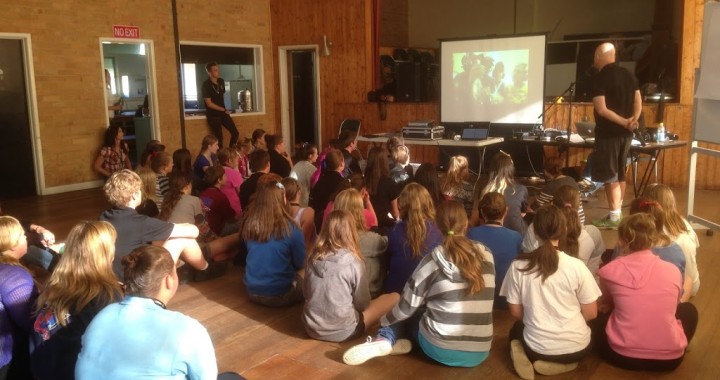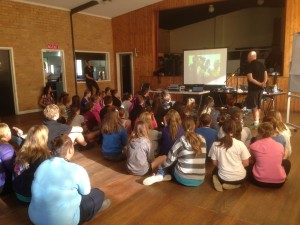Monthly Archives: May 2013
Last week we spoke about the need for youth workers in the education system to have good relationships. This week we look at the need for a good understanding of theory…youth work and educational.
In youth work we study youth development, theories of participation and many others that help us to work with young people in every situation we find ourselves in. Our theories often focus on the strengths of our young people to overcome the adversities they face. We develop our working styles around the strengths of our young people to provide a solid foundation to build relationship and work towards the future. Teachers also use their theory base to work on developing young people.
One of the most common theories that teachers use is called scaffolding. Scaffolding was developed by Russian Psychologist Lev Vygotsky in the early years of last century. Vygotsky believed that all understanding is built on the previous learnings of a person. That a process must be undertaken to build new knowledge on top of old knowledge in the same way we build a scaffold. Vygotsky also believed in the Zone of Proximal Development. A space between what a young person can do by themselves and what they could do with the help of an adult. These two theories have permeated educational systems throughout the world for over forty years.
Another theorist who has permeated the education system is Ivan Ilich, an Austrian philosopher, Roman Catholic priest, and social commentator on areas such as medicine and education. In 1971 his book “Deschooling Society” gave a radical slap in the face to institutional education and how it has has limited the learnings of young people in society. Instead he posits self-directed learning as a better option.
A number of other theories permeate the education system and depending on where in the world you are will depend on the theory that is at the forefront of educational practice. Using the relationships you have made ask a teacher or principal to give you an overview of the theoretical approaches that they use. If you have an understanding of the theories which underpin their work then you can work with them to develop a model of practice in their school which works for both parties.
What theories do your schools use?
A new paradigm for world wide youth work
For a long time now there has been a conversation going on in youth work. A professional/ para-professional dichotomy which many believe is subversive to the current push for professionalization. A conversation which preaches resistance to the neo-liberal free market push which seeks qualification over experience and cheap labour over appropriate supports.
The issue with requiring professionalism of a vocation is one which is being faced by social work in Australia and has been faced by psychologists. One of the issues which has and will continue to rear its head is if youth workers professionalise they will require higher pay. Higher pay in a free market means less workers. Less workers mean less appropriate service provision. Another issue is that of training and qualification. With over 75% of the current youth work employ holding a two year diploma or less where do we set the bar. The youth workers association in Victoria requires a bachelor degree for full membership. The Department of Human Services however only requires a Certificate IV for its youth work staff.
At Ultimate Youth Worker we believe that the professionalisation debate is currently doing more harm than good to youth work. In the storm and stress that is youth work we need all the boots on the ground that we can possibly muster. At Ultimate Youth Worker we see the current debate thinning out the herd. It makes qualifications the epitome of the profession and damns anyone else. Youth work throughout history has bucked the trends and required youth workers to think outside the square. The current push for professionalization places us firmly in the square.
Any dead fish can float with the current, It takes a live one to swim against it. We need a new paradigm to the idea of current professionalization ideology. We need well trained, well supported qualified youth workers! What we don’t need is a broad swathe approach to attaining this. We need a whole lot more practical wisdom in youth work. We need a whole lot more passion. We need a whole lot more accountability. What we do not need more of is control in the form of restricting sector size. We need to set ourselves apart from the pack.
What do you think? Leave us a comment below or post a comment on facebook and twitter.
If you haven’t yet, sign up for our newsletter to find out all the goings on at Ultimate Youth Worker. (Sign up here)
First step of faith for Ultimate Youth Worker’s
Welcome to another Monday Ultimate Youth Workers. I was recently read about the amazing work of Dr. Martin Luther King Jr. in the turbulent times of the 1960’s. There is something about a man who is thrown in to the deep end of such a massive issue that not only swims but tows a nation behind him. If that doesn’t motivate you nothing does.
One of Dr. King’s quotes that I read was, “Take the first step in faith. You don’t have to see the whole staircase, just take the first step”. Sometimes we don’t know what step two or three look like. We just have to take a leap. When Dr. King and the other brave residents who in 1955 Boycotted the Montgomery Bus for 385 days I am sure they didn’t think on day one that they would be there for over a year.
When Dr. King gave his “I have a dream” speech I don’t think that he saw the civil rights movement stalling after his death. I think he saw a moment in time where someone had to stand in the breach.
In his final days in 1968 Martin Luther King Jr. spoke with an authority and wisdom that some people say could only have come from a prophetic knowing that the end was near. Most of the time we do not know how our journey will end we just need to take the first step in faith and hope all will work itself out in the wash.
What is your first step in faith going to look like?
If you haven’t yet, sign up for our newsletter to find out all the goings on at Ultimate Youth Worker. (Sign up here)
Mental state exam for youth workers: Mood and Affect.
So far in this series we have been developing an understanding of the core components of a mental state exam. So far we have discussed how a young persons appearance, behaviour, speech and language can provide indicators as to their mental state. Today we discuss how a young persons mood and affect can provide insight into their current mental health status.
Mood
Mood is described using a young person’s own words. Happy, sad, angry, elated, anxious or apathetic. Many young people may be unable to describe their subjective mood state. Throughout my career I have seen a marked decrease in emotional intelligence in our society. It may take some work to flesh out how a young person feels. There are a number of resources to help young people to articulate their emotions, my personal favourites are mood dudes and the stones. In essence Mood is how young people see themselves in their own opinion.
 |
| Emotional intelligence in a squeeze ball |
The key to remember about mood is that it is subjective. The young person is the master of their own emotional state. Only they truly know what is going on inside.
Affect
Affect is noted by us when we observe the apparent emotion conveyed by the person’s nonverbal behaviour. Affect may be described as appropriate or inappropriate behaviour to the current situation, and as congruent or incongruent with their thought content. For example, a young person who shows a neutral affect when describing a very distressing experience such as family violence would be described as showing incongruent affect, which might suggest PTSD. The intensity of the young persons affect may be conveyed as normal, blunted, exaggerated, flat, heightened or overly dramatic.
A flat or blunted affect can be associated with schizophrenia, depression or post-traumatic stress disorder. Heightened affect might suggest mania, excitement or anxiety and an overly dramatic or exaggerated affect might suggest certain personality disorders. A young person may show a full range of affect, or a wide range of emotional expression during your assessment. They may move from heightened to blunted or they may only show a single affect.
The key to remember about affect is that it is objective. It is what you observe about a young person. The key here is to be clear about what you are observing and why you believe it means what you believe. For example, “Aaron appeared sad. He spoke slowly, kept eye contact on the ground and cried“.
Stay tuned next week as we discuss part five: Thought process and content.
Youth work in the education system
In the early days of my career I had the privileged of being a youth worker that went into our local high school. I was employed by my local church as a schools worker and spent much of my time running lunchtime programs. I spent much of my time building relationships with teachers, support staff and principals. I was in a lucky position. Many of my friends across the world had many more restrictions placed on them when working with and in schools.
One of the subjects in my Bachelor Degree was youth work and the schooling system in the course I learnt a lot about the way education has been framed through history and how it is placed in the current context. I also learnt that to be effective in the system that sometimes you had to work around the system. Honestly, it was one of my least favoured subjects. It really did not teach me how to work in the schooling system.
As youth workers we are guests in the education system. We are seen as providers of non-formal education… life skills and the like. When young people come to us they are not getting a qualification or an understanding of the three R’s (does that mean teachers can’t spell???). Instead we look after the other stuff. We develop the personal.
It is a sacred spot to work in the education system and we must honour the opportunity. The only way it can work is if the relationships are solid.
What do you think? Leave us a comment below or post a comment on facebook and twitter.
If you haven’t yet, sign up for our newsletter to find out all the goings on at Ultimate Youth Worker. (Sign up here)







